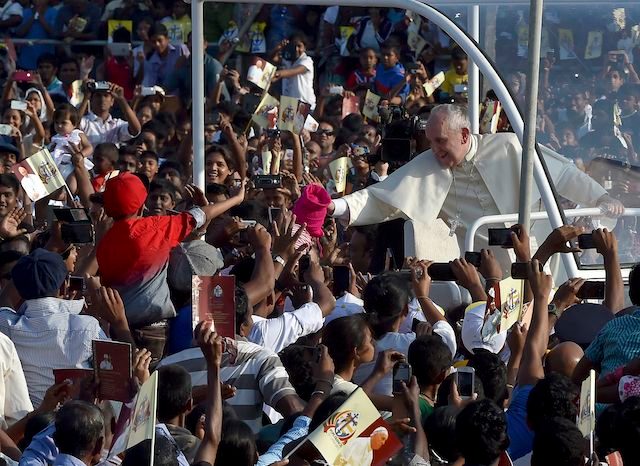SUMMARY
This is AI generated summarization, which may have errors. For context, always refer to the full article.

MANILA, Philippines – The first Pope from a developing country knows the problems of a developing country: traffic, sprawling concrete jungles, poor housing.
So in several passages of his environmental encyclical Laudato Si, Pope Francis urged urban planners to build more livable cities. How our cities are designed, he argued, affects human behavior and quality of life. (READ: Q&A: Pope’s green thesis: a global game-changer?)
Today’s cities – with their pollution, noise, and chaotic public transport systems – don’t make for people-friendly communities that uphold human dignity, he said.
It’s a message that centers on inequality and human dignity – themes that the Argentine pontiff has frequently underscored in previous speeches and letters.
“Many cities are huge, inefficient structures, excessively wasteful of energy and water. Neighborhoods, even those recently built, are congested, chaotic, and lacking in sufficient green space,” he wrote.
“We were not meant to be inundated by cement, asphalt, glass and metal, and deprived of physical contact with nature,” Francis added.
Noting the interrelationship between living space and human behavior, the pontiff urged city planners to go beyond the “beauty of design,” and to put people’s quality of life as first priority.
“More precious still is the service we offer to another kind of beauty: people’s quality of life, their adaptation to the environment, encounter, and mutual assistance. Here, too, we see how important it is that urban planning always take into consideration the views of those who will live in these areas,” he said.
For the Pope, historic preservation of common areas, visual landmarks, and urban landscapes has its own special relevance: protecting these places “increase our sense of belonging, of rootedness, of ‘feeling at home’ within a city which includes us and brings us together.”
Designing cities to create interconnectedness, the Pope says, is vital to people’s happiness.
“It is important that the different parts of a city be well integrated and that those who live there have a sense of the whole, rather than being confined to one neighborhood and failing to see the larger city as space which they share with others.”
The problem of inequality
Not only are our current cities unhealthy and unlivable, the few pockets of beauty left are being restricted to an exclusive few. In his encyclical, Francis also hit at the underlying problem of inequality, saying that “the privatization of certain spaces has restricted people’s access to places of particular beauty.”
“In others, ‘ecological’ neighborhoods have been created which are closed to outsiders in order to ensure an artificial tranquillity. Frequently, we find beautiful and carefully manicured green spaces in so-called ‘safer’ areas of cities, but not in the more hidden areas where the disposable of society live,” he said.
Those on the fringes of society, Francis added, are also relegated to the sidelines when it comes to getting good houses – another factor affecting their sense of dignity.
He urged city planners and officials to avoid heaping “suffering upon suffering” and find creative ways to provide decent housing and integrate their neighborhoods into a welcoming city:
“How beautiful those cities which overcome paralyzing mistrust, integrate those who are different and make this very integration a new factor of development! How attractive are those cities which, even in their architectural design, are full of spaces which connect, relate and favor the recognition of others!”
The Pope known for shunning expensive luxury vehicles also had something to say about poor public transport systems.
With traffic congestion creating pollution, and the construction of public roads marring the urban landscape, Francis echoed experts’ assessments to give public transportation top priority.
But in many places around the world, the public transport system strips commuters of their dignity.
“Many specialists agree on the need to give priority to public transportation. Yet some measures needed will not prove easily acceptable to society unless substantial improvements are made in the systems themselves, which in many cities force people to put up with undignified conditions due to crowding, inconvenience, infrequent service and lack of safety,” he said. – Rappler.com
Add a comment
How does this make you feel?
There are no comments yet. Add your comment to start the conversation.